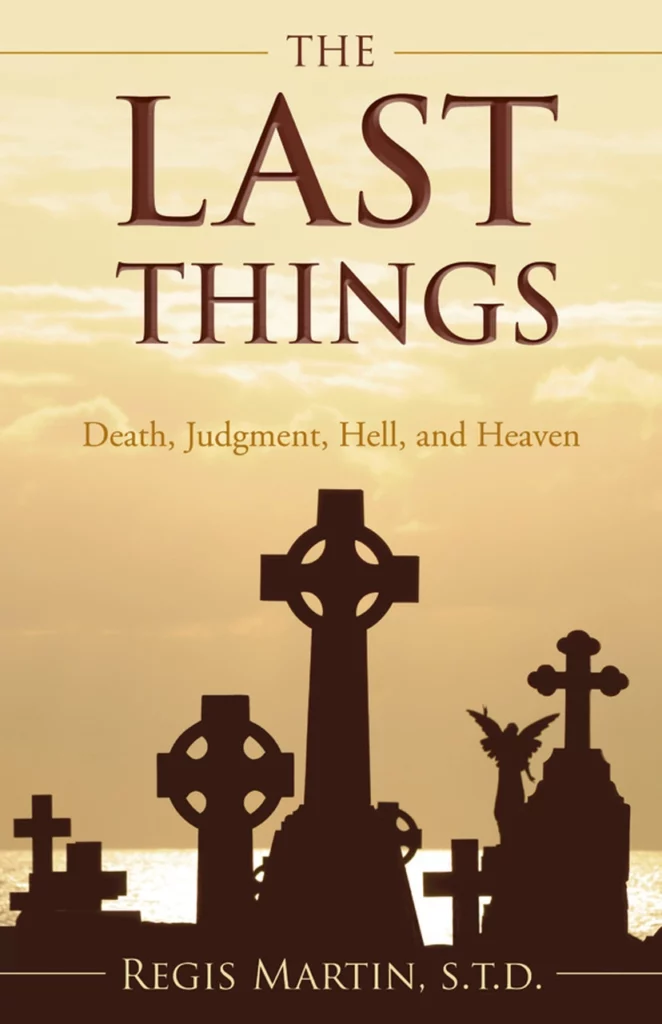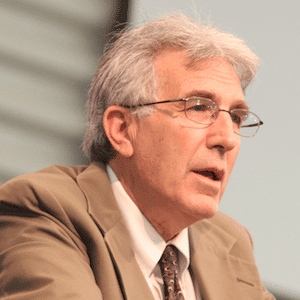Try to imagine the one thing in this world that is most worth knowing – by everyone. The thing that is most worth having. Something the sheer longing for which could never be dismissed merely as a function of time or space, tribe or temperament. Is there a sentient being around who has not felt it, wondered about it, made some effort to obtain it?
Could it have something to do with the final outcome of our lives? Or the lives of those whom we love? Lives no longer with us but lost, whom we long once more to see, to be with. What does Christianity offer us in this regard? Has the Church anything distinctive to say about it? And if so, can it assuage this most deep and persisting of human hungers?
The answers to these questions, and a clutch of others besides, are to be found in the Church’s doctrine of the Last Things. Eschatology, which is a term deriving from the Greek word eschata, meaning “outcomes” or “ends,” is very simply the fruit of the Church’s most profound reflection on the meaning of Death, Judgment, Hell, and Heaven (also Purgatory, Limbo, the Second Coming of Christ, and the End or Transfiguration fo the World).
Traditionally referred to as the Four Last Things, these are the mysteries that bear most directly on the final section of the Creed, namely, “the resurrection of the body, and life everlasting,” the loftiest realities to which Christian belief may be expected to aspire. “We seek the city that is to come,” declares the author of the Letter to the Hebrews. “I am the resurrection and the life,” says Jesus. “He who believes in me, through he die, yet shall he live.”
But what a strangely perverse silence fills the air the moment the subject is brought up! It is not matter for astonishment that while all the ancient peoples incessantly reflected on the nature of the next world, having wisely intuited the impermanence of this passing one, hardly any self-respecting modern appears the least bit interested in the “hereafter”? How seldom, for example, modern man thinks of death, an event that, after all, represents the real point of entry into eternity.
Respice finem, which means “look to the end,” is an ancient pagan motto whose message the Christian religion early on embraced. Indeed, Jesus himself enjoined his disciples to watch and wait, mindful of the End: “Therefore you also must be ready; for the Son of man is coming at an hour you do not expect.” However, for most self-styled, enlightened folk, it is hardly the thing to which they are to look at the moment. (The irony, to be sure, is that by the time they finally do turn their minds to the end, it will very likely be the End.) “Humankind cannot bear very much reality,” says T.S. Eliot.
In that wonderful Edwardian saga The Man of Property, written by John Galsworthy, revealing, among other failings of the Forsyte family, a quite impenetrable complacency about almost everything, one reads the following description of this “upper middle-class family in full plumage”: “When a Forsyte was engaged, married, or born, the Forsytes were present; when a Forsyte died – but no Forsyte had as yet died; they did not die; death being contrary to their principles, they took precautions against it, the instinctive precautions of highly vitalized persons who resent encroachments on their property.”
Given the extent of modern man’s flight from death, from the “hereafter,” one has got to ask in all seriousness whether the human hunger for Heaven has become some sort of vestigial organ. Is it possible for the wings of the human spirit to atrophy for want of use? Nowadays to speak of man’s pilgrim status, of his promised homeland in heaven, of the travail of the world and hope for life beyond the grave, is to invite a blank state of stupefaction among the many for whom eternity has lost all attraction.
Of course, such silence about the End exacts a heavy price. We instinctively know the last act will prove bloody, however pleasant the intervening play. None of us, including the most fatuous of the Forsytes, is exempt from that final nightfall, through the silence of which we shall all someday pass. Alone, we shall pass through the door of Death, which admits only one at a time; we’ve all been scheduled to go through it. “Someday,” Karl Barth writes, “a company of men will process out to a churchyard and lower a coffin and everyone will go home; but one will not come back, and that will be me. The seal of death will be that they will bury me as a thing that is superfluous and disturbing in the land of the living.”
Yes, silence, denial, and flight from man’s finitude exact a fearful price in the end. “They throw earth over your head and it is finished forever,” reports Pascal (Which is precisely why the author of the Pensées adds, “We run heedlessly into the abyss after putting something in front of us to stop us seeing it.” We are, says Eliot, “distracted from distraction by distraction).
In any case, eschatological forgetfulness, especially on the part of Christians, will simply force the world to look elsewhere for information and consolation about the End. When men cease to hear the truth about Death or eternal life from Christians, the truth that it is their chief business to dispense, they will not blunder forth like nihilists believing nothing.
No, they will more than likely hear and believe anything. Even nonsense is preferable to nihilism. If no one gets out alive, if death is an ambush necessarily awaiting us all, then who among us will not stoop to make even the silliest and most aberrant provision for it?
“For to act in aberration,” writes Whittaker Chambers, “is at least more like living that to die of futility, or even to live in that complacency which is futility’s idiot twin. We all know those grand aberrations of our time. We have plenty of names for them…But all the aberrations have one common cause, and point, in the end, in one direction.” And that direction, of course, is death, despair. “The one essential condition of human existence,” Chambers quotes Stefan Trofimovitch, a character in Dostoevsky’s The Possessed,
“Is that man should always be able to bow down before something infinitely great. If men are deprived of the infinitely great, they will not go on living and will die of despair.” It is for this that we crave reality…”I want to know why,” Sherwood Anderson asked. I want to know why. It is for this we seek a little height, and because of this we do not feel it too high a price to pay if we cannot reach it crawling through a lifetime on our hands and knees, as a wounded man sometimes crawls from a battlefield, if only so as not to die as one more corpse among so many corpses.
As Dr. Johnson used to say, nothing so wonderfully concentrates the mind as the knowledge that a man is to be hanged in a fortnight. Who wants to go to his own hanging unprepared?
In the face of death, then, that ineluctable irruption we cannot finally postpone, two salutary truths emerge for our consideration. The first, of course, is the reminder that here begin the things that come last, so pray do not put off thinking about them. Defer the thought as long as you please; the thing itself will come in any case.
Why not attend to it now? “Men shun the thought of death as sad,” writes Archbishop Fenelon, “but death will only be sad to those who have no thought of it. It must come sooner or later, and then he who has refused to see the truth in life will be forced to fact it in death.”
Is not the decisive Socratic maxim “the unexamined life is not worth living,” which countless first-year philosophy students have had to memorize, really nothing more than an extended meditation on death? Without pushing it as far as, say, Plotinus, who hesitated even to give out his address, so much did he hate being in the body, is it not the case that the care of the soul, which is central to man, requires constant reference to the fact and event of death?
“We should remember,” says Cardinal Newman, “that this life is scarcely more than an accident of our being – that it is no part of ourselves, who are immortal; that we are immortal spirits, independent of time and space, and that this life is a sort of outward stage, on which we act for a time, and which is only sufficient and only intended to answer the purpose of trying whether we will serve God or no.”
It makes all the difference in the world, says Pascal, “if it is certain that we shall not be here for long, and uncertain whether we shall be here even one hour.” Respice finem indeed.
Under the circumstances, those who saunter along such a stage, supposing its duration to be forever, will be greatly surprised when, at the last curtain call, the stage and all its props are swept completely away. Death will have proven to be a startling and salutary reminder in helping them overcome the illusion of the world’s finality.
So here begin the things that come last. And, point two, here begin the things that will forever last. What have we to do with the allurements of a passing world when, already baptized into the world to come, we cannot belong to this one? Why be anxious about duration or delight in this world when our hearts belong to another? And if everything there is arranged to meet our deepest longings, to quench our most ardent and immortal thirsts, why tarry in the ante-chamber of joy?
“To those who live by faith,” says Newman, “everything they see speaks of that future world; the very glories of nature, the sun, moon, and stars, and the richness and he beauty of the earth, are as types and figures witnessing and teaching the invisible things of God. All that we see is destined one day to burst forth into a heavenly bloom, and to be transfigured into immortal glory. Heaven at present is out of sight, but in due time, as snow melts and discovers what it lay upon, so will this visible creation fade away before those greater splendors which are behind it, and on which at present it depends.”
Thus, as Eliot announces in Four Quartets, “In my end is my beginning.”
When we ponder the meaning of such realities, literally, the Last Things ever to be remembered, we are engaged in an essential exercise that bears on the whole content of Christian hope. And hope is an enormously important, if widely neglected and misunderstood, virtue; to enter upon the study and practice of it will lead one to the heart of the Christian mystery.
This article is taken from part of a chapter in The Last Things: Death, Judgment, Hell, and Heaven by Dr. Regis Martin, STD which is available from TAN Books.









